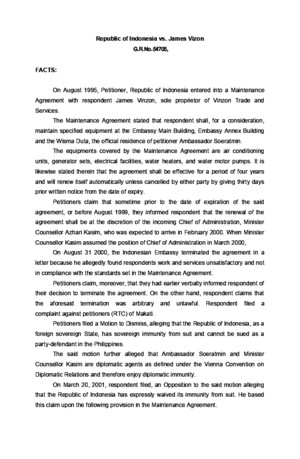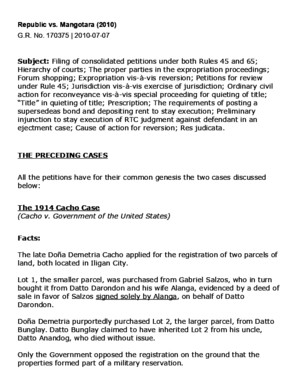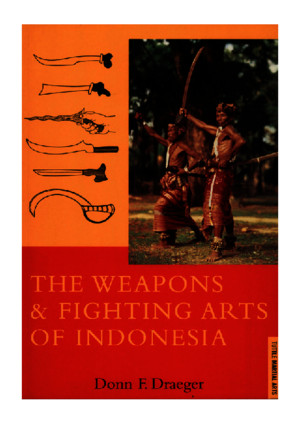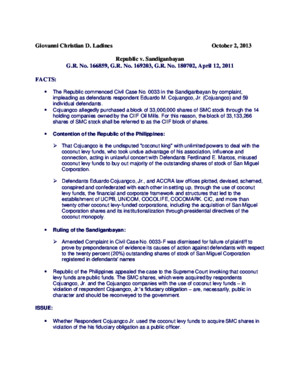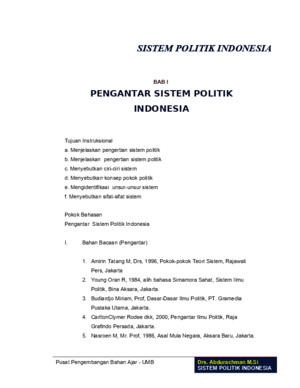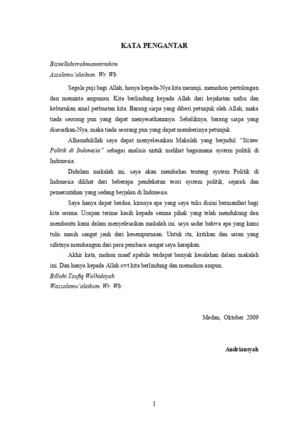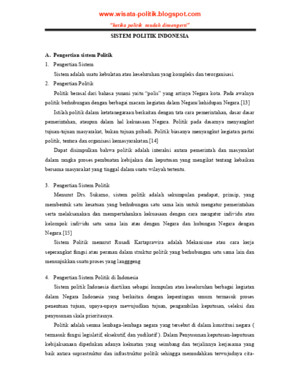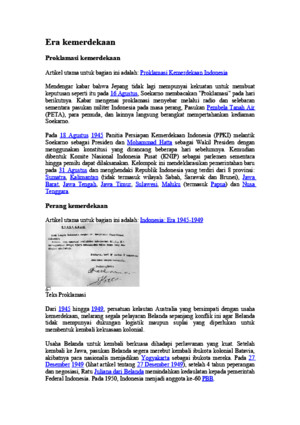Republic of Indonesia vsvinzon
There is document - Republic of Indonesia vsvinzon available here for reading and downloading. Use the download button below or simple online reader.
The file extension - PDF and ranks to the Documents category.
Tags
Related
Comments
Log in to leave a message!
Description
REPUBLIC OF INDONESIA vs JAMES VINZON GR No 154705 June 26, 2003 FACTS: Petitioner, Republic of Indonesia, entered into a Maintenance Agreement in August 1995 with respondent James Vinzon, sole proprietor of Vinzon Trade and Services The agreement stated that respondent shall, for a consideration, maintain specified equipment at the Embassy Main Building, Embassy Annex Building and the Wisma Duta, the official residence of petitioner Ambassador Soeratmin The equipments covered by the agre
Transcripts
REPUBLIC OF INDONESIA vs JAMES VINZON GR No154705 June 26, 2003FACTS: Petitioner, Republic of Indonesia, entered into aMaintenance Agreement in August 1995 with respondent JamesVinzon, sole proprietor of Vinzon Trade and Services Theagreement stated that respondent shall, for a consideration,maintain specified equipment at the Embassy Main Building,Embassy Annex Building and the Wisma Duta, the officialresidence of petitioner Ambassador Soeratmin The equipmentscovered by the agreement are air conditioning units, generator sets, electrical facilities, water heaters, and water motor pumpsThe agreement shall be effective for a period of four years andwill renew itself automatically unless cancelled by either party bygiving thirty days prior written notice from the date of expiryPetitioners claim that sometime prior to the date of expiration of the said agreement, they informed respondent that the renewalof the agreement shall be at the discretion of the incoming Chief of Administration, who allegedly found respondents work andservices unsatisfactory and not in compliance with thestandards set in the Agreement Hence, the IndonesianEmbassy terminated the agreement Petitioners claim that theyhad earlier verbally informed respondent of their decision toterminate the agreementOn the other hand, respondent claims that the aforesaidtermination was arbitrary and unlawfulHence, respondent filed a complaint in the (RTC) of MakatiPetitioners filed a Motion to Dismiss, alleging that the Republicof Indonesia, as a foreign sovereign State, has sovereignimmunity from suit and cannot be sued as a party-defendant inthe Philippines The said motion further alleged that Ambassador Soeratmin and Minister Counsellor Kasim arediplomatic agents as defined under the Vienna Convention onDiplomatic Relations and therefore enjoy diplomatic immunity Inturn, respondent filed on March 20, 2001, an Opposition to thesaid motion alleging that the Republic of Indonesia hasexpressly waived its immunity from suit He based this claimupon the following provision in the Maintenance Agreement: Any legal action arising out of this Maintenance Agreement shallbe settled according to the laws of the Philippines and by theproper court of Makati City, PhilippinesRespondents Opposition likewise alleged that Ambassador Soeratmin and Minister Counsellor Kasim can be sued and heldliable in their private capacities for tortious acts done with maliceand bad faithThe trial court denied herein petitioners Motion to Dismiss Itlikewise denied the Motion for Reconsideration subsequentlyfiledThe trial courts denial of the Motion to Dismiss was brought upto the Court of Appeals by herein petitioners in a petition for certiorari and prohibition Said petition alleged that the trial courtgravely abused its discretion in ruling that the Republic of Indonesia gave its consent to be sued and voluntarily submitteditself to the laws and jurisdiction of Philippine courts and thatpetitioners Ambassador Soeratmin and Minister Counsellor Kasim waived their immunity from suitOn May 30, 2002, the Court of Appeals rendered its assaileddecision denying the petition for lack of merit It denied hereinpetitioners motion for reconsideration ISSUE: WON the Court of Appeals erred in sustaining the trialcourt¶s decision that petitioners have waived their immunity fromsuit by using as its basis the abovementioned provision in theMaintenance Agreement RULING: The petition is impressed with meritInternational law is founded largely upon the principles of reciprocity, comity, independence, and equality of States whichwere adopted as part of the law of our land under Article II,Section 2 of the 1987 Constitution The rule that a State may notbe sued without its consent is a necessary consequence of theprinciples of independence and equality of States Asenunciated in Sanders v Veridiano II, the practical justificationfor the doctrine of sovereign immunity is that there can be nolegal right against the authority that makes the law on which theright depends In the case of foreign States, the rule is derivedfrom the principle of the sovereign equality of States, asexpressed in the maxim par in parem non habet imperium Allstates are sovereign equals and cannot assert jurisdiction over one another A contrary attitude would unduly vex the peace of nationsThe rules of International Law, however, are neither unyieldingnor impervious to change The increasing need of sovereignStates to enter into purely commercial activities remotelyconnected with the discharge of their governmental functionsbrought about a new concept of sovereign immunity Thisconcept, the restrictive theory, holds that the immunity of thesovereign is recognized only with regard to public acts or acts jure imperii, but not with regard to private acts or acts juregestionisIn United States v Ruiz, for instance, we held that the conductof public bidding for the repair of a wharf at a United StatesNaval Station is an act jure imperii On the other hand, weconsidered as an act jure gestionis the hiring of a cook in therecreation center catering to American servicemen and thegeneral public at the John Hay Air Station in Baguio City, as wellas the bidding for the operation of barber shops in Clark Air Base in Angeles City Apropos the present case, the mere entering into a contract bya foreign State with a private party cannot be construed as theultimate test of whether or not it is an act jure imperii or juregestionis Such act is only the start of the inquiry Is the foreignState engaged in the regular conduct of a business? If theforeign State is not engaged regularly in a business or commercial activity, and in this case it has not been shown to beso engaged, the particular act or transaction must then be tested by its nature If the act is in pursuit of a sovereign activity,or an incident thereof, then it is an act jure imperiiHence, the existence alone of a paragraph in a contract statingthat any legal action arising out of the agreement shall besettled according to the laws of the Philippines and by aspecified court of the Philippines is not necessarily a waiver of sovereign immunity from suit The aforesaid provision containslanguage not necessarily inconsistent with sovereign immunityOn the other hand, such provision may also be meant to applywhere the sovereign party elects to sue in the local courts, or otherwise waives its immunity by any subsequent act Theapplicability of Philippine laws must be deemed to includePhilippine laws in its totality, including the principle recognizingsovereign immunity Hence, the proper court may have noproper action, by way of settling the case, except to dismiss itSubmission by a foreign state to local jurisdiction must be clear and unequivocal It must be given explicitly or by necessaryimplication We find no such waiver in this caseRespondent concedes that the establishment of a diplomaticmission is a sovereign function On the other hand, he arguesthat the actual physical maintenance of the premises of thediplomatic mission, such as the upkeep of its furnishings andequipment, is no longer a sovereign function of the StateWe disagree There is no dispute that the establishment of adiplomatic mission is an act jure imperii A sovereign State doesnot merely establish a diplomatic mission and leave it at that;the establishment of a diplomatic mission encompasses itsmaintenance and upkeep Hence, the State may enter intocontracts with private entities to maintain the premises,furnishings and equipment of the embassy and the livingquarters of its agents and officials It is therefore clear thatpetitioner Republic of Indonesia was acting in pursuit of asovereign activity when it entered into a contract withrespondent for the upkeep or maintenance of the air con units,generator sets, electrical facilities, water heaters, and water motor pumps of the Indonesian Embassy and the officialresidence of the Indonesian ambassadorThe Solicitor General submits that, the Maintenance Agreementwas entered into by the Republic of Indonesia in the dischargeof its governmental functions In such a case, it cannot bedeemed to have waived its immunity from suit As to theparagraph in the agreement relied upon by respondent, theSolicitor General states that it was not a waiver of their immunityfrom suit but a mere stipulation that in the event they do waivetheir immunity, Philippine laws shall govern the resolution of anylegal action arising out of the agreement and the proper court inMakati City shall be the agreed venue thereofOn the matter of whether or not petitioners Ambassador Soeratmin and Minister Counsellor Kasim may be sued hereinin their private capacities, Article 31 of the Vienna Conventionon Diplomatic Relations provides:1 A diplomatic agent shall enjoy immunity from the criminal jurisidiction of the receiving State He shall also enjoy immunityfrom its civil and administrative jurisdiction, except in the caseof:(a) a real action relating to private immovable property situatedin the territory of the receiving State, unless he holds it on behalf of the sending State for the purposes of the mission;(b) an action relating to succession in which the diplomaticagent is involved as executor, administrator, heir or legatee as aprivate person and not on behalf of the sending State;(c) an action relating to any professional or commercial activityexercised by the diplomatic agent in the receiving State outsidehis official functionsThe act of petitioners Ambassador Soeratmin and Minister Counsellor Kasim in terminating the Maintenance Agreement isnot covered by the exceptions provided in the abovementionedprovisionThe Solicitor General believes that said act may fall under subparagraph (c) thereof, but said provision clearly applies onlyto a situation where the diplomatic agent engages in anyprofessional or commercial activity outside official functions,which is not the case hereinThe petition was GRANTED
Recommended

